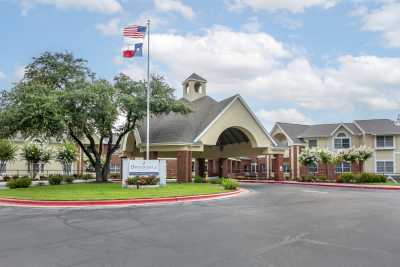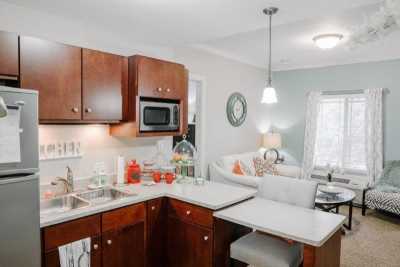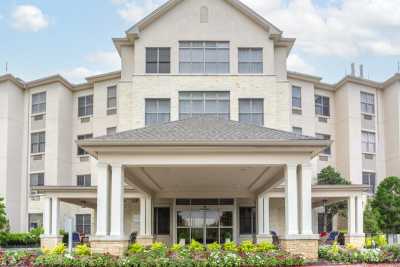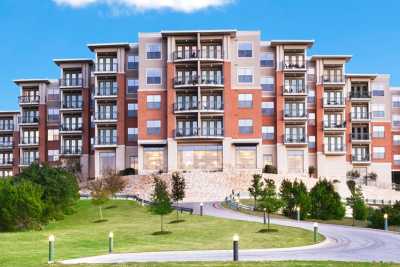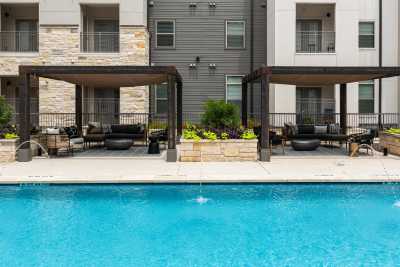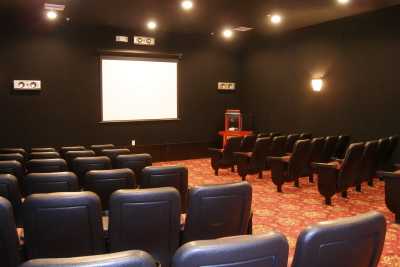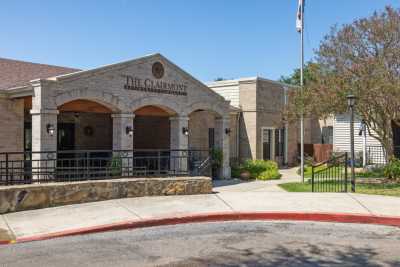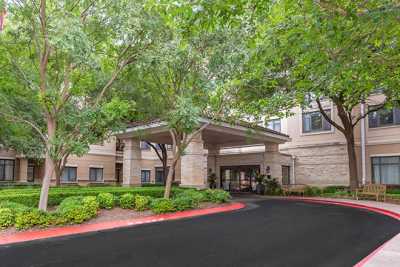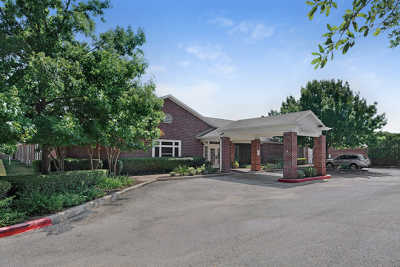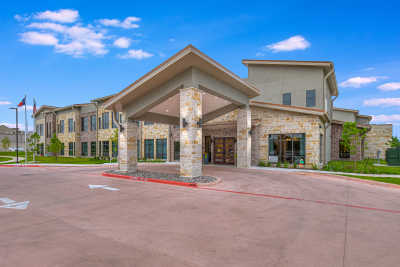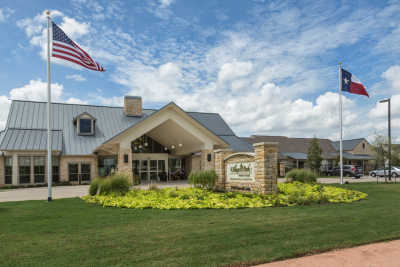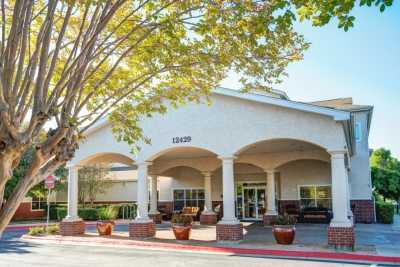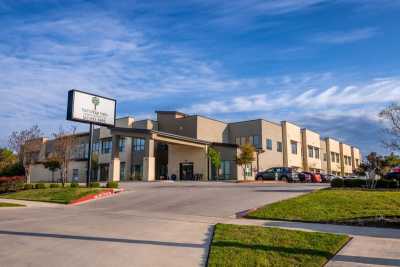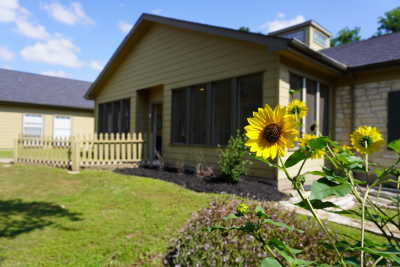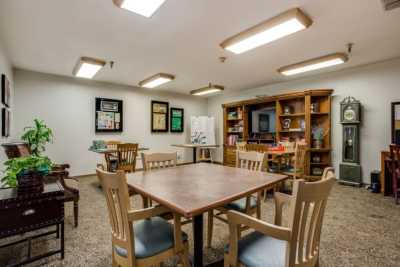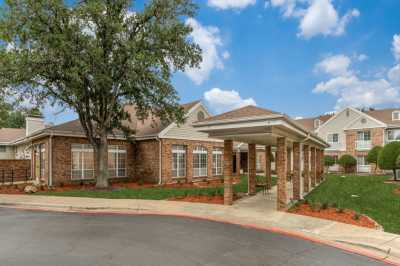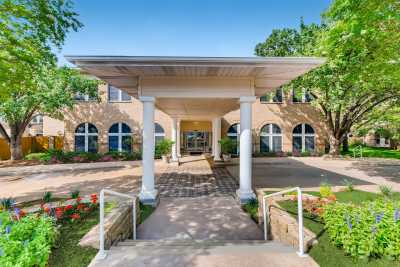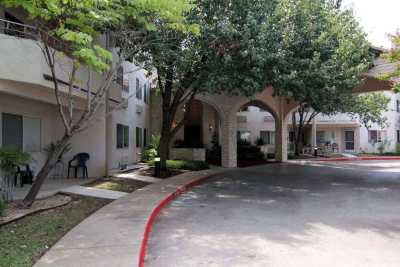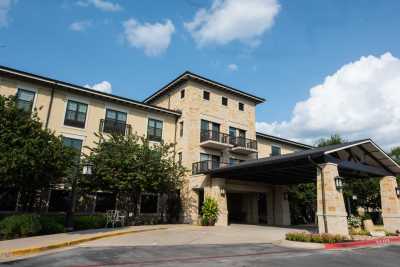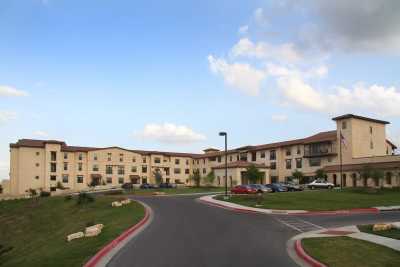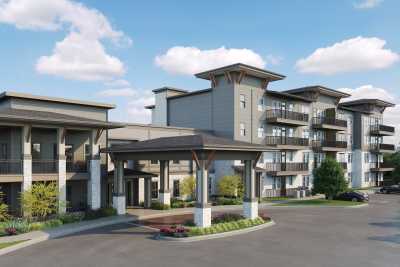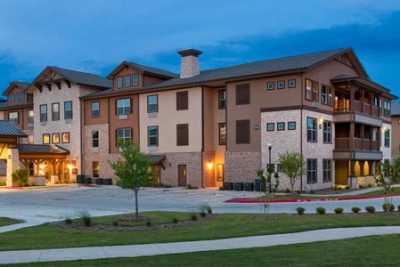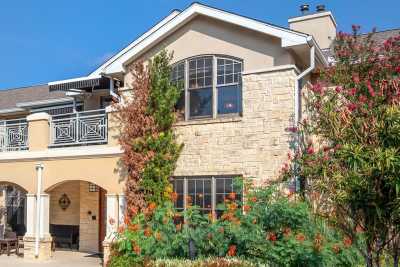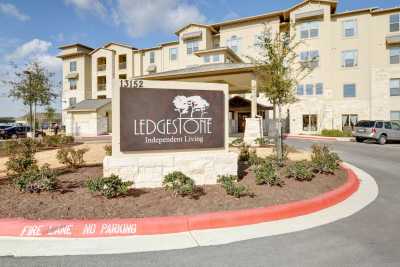
10 Best Independent Living Communities in Austin, TX
Austin is known as a cultural hub filled with tasty eats, lively music, and a variety of activities. Though the city has become wildly popular among millennials over the last decade, it’s still an increasingly aging-friendly place. The warm summers, mild winters, and classic Southern hospitality entice seniors while the robust senior living options help them find an ideal home in the vast city. To help seniors stay active and enjoy all the city has to offer, Austin offers 14 independent living communities scattered throughout a 10-mile radius of its downtown.
Independent living enables seniors to age alongside individuals in the same age group. It eliminates the daily stressors of homeownership and renting, as residents no longer spend their time cooking, cleaning, or driving — unless it’s something they wish to do. Convenient amenities and services help seniors age gracefully as they continue doing the things they love.
In this guide, you’ll be able to narrow down your search by browsing through our in-network Austin independent living facilities based on factors that matter most to you — affordability, services, activities, and amenities. You’ll also learn about local independent living costs, how seniors pay, and independent living features, as well as local senior demographics, resources, and activities.
Austin Independent Living Facilities | 1448 Reviews
[name removed] and [name removed] in assisted living are some of the most caring and decent people I have ever met! All the staff touch exceptional care of my mom.
It's a 4. Would be a 5 but they appear to be understaffed and the common area carpeting needs cleaning to remove spills and spots and overall dinginess. Very nice mgmt however. Quick to respond. Yes, I would...
Brookdale NWH is a perfect place for my mother. We are very happy with the care she receives. My mother is well taken care of. The caregivers are kind and compassionate. She has a spacious room and the food...
The location is great. There seems to be some sort of activity. My mom takes part in every day. I think the cost are too high and could either include more or price could be less
The facility was recently remodeled. It's modern, inviting & classy! Not to mention, well maintained & pristine. The staff is incredible. They are friendly, attentive to needs, interact with the residents &...
They could clean apartments more thoroughly. Food needs more basic options. [name removed] goes above and beyond to help with anything!
Clairmont staff have been remarkably warm, friendly, and helpful from the beginning. The staff that my parents now interact with residents, including maintenance, dining, and transportation, go out of their...
Very attentive, great follow-up to concerns identified by residents. What stuck out was the condition of apts. Indoor pool. Relationships between staff and residents
Brookdale North Austin has been such an amazing community to my mother. Not only do they provide outstanding care to their residents, but they also don't have high turnover, so you know who's caring for your...
Love that place. The staff is exceptional. They are helpful and they communicate very well. The faculty is nice and quiet and is placed in the woods. The food is well prepared and the menu is always...
Our free advisors can help
- Compare local facilities
- Determine care type
- Schedule tours
- Evaluate pricing
The administrative staff is good and helpful. The director is Good to work with and on top of things - they are good. The workers are ok. You know how that goes. Most of the women do a good job. The men are...
We have lived here 6 years. It is not like home, but there comes a time in our life when we have to make adjustments. The Village seemed to fit our needs better than any others which we saw. It is close to...
Love the idea that they offer numerous activities daily. And they encourage The clients to be involved. Of course I wish it wasn't so expensive. But they are all very expensive. But some are more expensive...
All good so far. It is Seemingly well managed and generally courteous and helpful staff. Good service in regard to housekeeping.
Sodalis is a warm and inviting facility. The staff is friendly. The residents seem to be happy and content. The food is good. The facility is clean. It is the only facility I toured that I would consider...
The staff is courteous. There are plenty of activities. When I checked it had the lowest price of any facility in Austin. The sales representative is courteous kind and willing to help out prospective...
Whenever I call my questions and inquiries are always answered quickly....Room size is great I can't really answer about the activities because [name removed] doesn't participate in any. And the food not...
I know that Asher Point recently acquired this property and I can see how they are making every effort possible to make it appealing. The staff is very friendly and accommodating. My friend is in assisted...
I think they are under underrated food is good and the staff trying hard. Under mined by corporate All in all I would recommend
I thought they did a great job reaching out and trying to meet our ever-changing needs... We had to find a place that would allow mom and dad to be together. Mom had been diagnosed with cancer in February...
I would say to come and visit because you will enjoy it. They have activities like work outs all day, indoor swimming pool, there is a card room, a theater and evening activities. There is so much to do that...
I will give everything a 10 I know you want only a 5 Amberlin Pflugerville is the best apartment/ 55+ place I have ever lived. The staff is amazing 99% of the residents are amazing. I can't keep up with all...
We chose Isle at Cedar Ridge for my father’s advanced care needs, and it’s been the best decision. Their two-person assist and diabetic management services are handled flawlessly. The Memory Support program...
This is the perfect place for my Mother, she is doing very well there and some of the staff has been there for 10+ years. The staff that I have met truly cares about their residents. I have not had any other...
I truly do rate all areas a 5 as it is great here! Staff go out of their way to ensure you have whatever you need. Environment is positive and friendly. There are more activities than you could do with...
Our methodology
How we rank order the Austin community options above
We developed a proprietary recommendation system that orders Austin community options based on factors we know are important to seniors and their families:
- Proximity to your search location
- Availability of recent, high-quality reviews
- The amount of detailed community information available
Where we source our information
14,000+ communities
We collect proprietary data from our network of 14,000+ senior living communities in the U.S., with regular refreshes of data and information
350,000+ reviews
We have 387,000+ reviews from senior living residents and family members that provide first-hand accounts about senior living communities
- Costs of independent living in the Austin area
- What families are saying about independent living in Austin
- How people pay for independent living in Austin
- Understand Texas laws and regulations for independent living communities
- Austin: A unique and aging-friendly city for active seniors
- Austin independent living services and amenities
- Explore senior care with confidence
- Unfamiliar with Austin? Highlights for seniors
Costs of independent living in the Austin area
The median rent for independent living in Austin is $3,775 per month, according to A Place for Mom’s 2022-2023 proprietary data on partnering facilities.[01] This cost is significantly higher than the average rent cost for an apartment in Austin. However, it’s for good reason as rent includes built-in costs for the following services and amenities:
- A dining plan with three meals and snacks
- Maintenance and landscaping
- Day trips and outings to local attractions and events
- On-site activities (fitness classes, interest clubs, game nights, etc.)
- On-site amenities (pools, crafts centers, libraries, movie theaters, fitness centers, etc.)
For additional monthly fees, Austin independent living residents can also benefit from convenient on-site services, such as:
- Room service and special meal accommodations
- Housekeeping and laundry services
- Beauty salon and barber shop services
- Transportation services
The following costs represent average baseline costs across the area and give a good cost comparison of nearby cities. However, these costs don’t account for any additional fees paid by residents.
Average monthly cost of Independent Living in Austin, TX vs. nearby cities
Average monthly cost of Independent Living in Austin, TX vs. the state and national average
Average monthly cost of Independent Living in Austin vs. other types of senior living
Median monthly costs of Independent Living in Austin, TX by room type
What families are saying about independent living in Austin
Recent reviews for independent living in Austin
Brookdale Lohmans Crossing in Austin, TX
Sundara Senior Living in Round Rock, TX
Grace House Assisted Living in Austin, TX
Reviews mention these favorite features of communities
How people pay for independent living in Austin
Seniors typically rely on private retirement funds to pay for independent senior living in Austin, as Medicaid and Medicare do not cover independent living room and board costs. However, seniors can still save on health care costs and pay for potential senior care services in the future using Medicaid and Medicare.
Depending on their history and current situation, seniors may also use their veterans benefits and/or Social Security benefits to defray some costs of senior independent living in Austin, Texas. Learn about all of these methods and more in this section.
Most seniors pay for Austin independent living using private payment methods, which include all personal income and asset resources. Your income might include savings accounts, retirement pensions, investment returns, and/or Social Security benefits. All of these methods can be used to pay for independent living in Austin. Plus, Texas seniors are in luck as Texas doesn’t levy a personal income tax, so these income sources aren’t taxed at the state level.
Depending on your resources and current situation, you may also combine a few of these private pay methods to cover independent living costs:
- Selling a house. Many seniors moving into independent living are looking to downsize, often resulting in the sale of a house, which could free up some funds to help you pay for independent living.
- Reverse mortgage. If selling your house isn’t an option, you might want to consider a reverse mortgage. This option will allow you to borrow from your home’s equity to pay for some independent living costs.
- Life insurance. You can sell, surrender, or borrow from a life insurance policy to free up some cash for independent living costs.
- Social security benefits. If you’re a former worker, you might qualify for some Social Security benefits. The most common is Social Security Retirement (SSR), which provides a monthly check to you after retirement.
Can I use veterans benefits to pay for independent living?
If you’re a veteran, you can use additional funds provided by the U.S. Department of Veterans Affairs (VA) to pay for rent at an independent living community. Senior veterans and their surviving spouses may be eligible for VA pension benefits. The Aid and Attendance benefit is especially important for seniors as it can be added to their existing VA pension benefits to cover anything that improves a senior’s quality of life — which could include independent living.
Do I qualify for veterans benefits?
If you’re unsure about your eligibility for VA benefits, don’t fret. You can reach out to a local veteran service organization (VSO) to help you find options you may not know about. They’ll even help you successfully file for a claim or appeal a denied claim.
VSOs are vetted by the VA to provide assistance and resources to veterans, so it’s in your best interest to reach out a local VSO before applying for benefits. Some Austin independent living communities also partner with local veteran programs to help potential senior residents obtain the benefits they’ve earned.
Number of veterans who live in Austin
Approximately 39% of Austin veterans are 65+
Resources for Austin veterans
Travis County Veterans Services Department
5325 Airport Blvd.
Austin, TX 78751
Phone: 512-854-9340
Hours: Monday through Thursday, 9 a.m. – 4 p.m. (By appointment only)
Virtual contact: Veterans services contact form
Texas Veterans Commission (TVC)
1700 N. Congress Ave., Suite 800
Austin, TX 78701
Phone: 512-475-2395
Regional Disabled American Veterans (DAV) office
VA Regional Office — One Veterans Plaza
701 Clay Ave.
Waco, TX 76799
Phone: 254-299-9932
Hours: Monday through Friday, 8:30 a.m. – 4 p.m.
What is Medicaid and can I use it to pay for independent living in Austin?
Medicaid is a public health insurance program jointly funded by the Texas and federal governments. It cannot be used to pay rent at an independent living facility in Austin, Texas, but it can be used to cover long-term health care services and medically necessary in-home care services received within an independent living community.
Most Texas seniors who receive Medicaid receive their coverage through STAR+PLUS, the state’s managed care program run by the Texas Health and Human Services Commission (or the HHSC). This program is specifically for seniors 65+ and individuals with disabilities. To qualify for the Medicaid program, you mustn’t exceed a monthly income of $2,742 as an individual or $5,484 as a couple.[03]
If you’re planning for care needs that may arise in the future, be sure to learn about STAR+PLUS’ Home and Community Based Services waiver program. It can be used to cover the cost of some personal care services, health care services, and medical supplies within a care facility.
What is Medicare, and can I use it to pay for independent living in Austin?
Medicare is a federal health insurance program and anyone who is 65+ and/or disabled qualifies for it within the state of Texas. It cannot be used to cover rent or living costs at an independent living community, but it can help cover many medical services. Some services include hospital stays, hospice care, certain doctors’ services, outpatient care, medical supplies, and preventative services.
If you’re a senior who qualifies for Texas Medicare, you can receive assistance with your Medicare application, legal advice, and referrals by utilizing the resources listed below. Legal aid attorneys may direct financially eligible, low-income seniors to the Texas Medicare Savings Program — which aids seniors with their Medicare premiums, deductibles, coinsurance, and/or copayments. If you have additional questions about Medicare, you can visit the federal Medicare website or dial 2-1-1.
What if I qualify for both Medicare and Medicaid?
If you’re an Austin resident who qualifies for both Medicare and Medicaid, you might qualify for dual coverage. The state of Texas offers a joint Medicare-Medicaid Plan (MMP) called the Dual Eligible Integrated Care Demonstration Project, commonly referred to as “the Demonstration.”
With the Demonstration, Texas strives towards the following:
- Improve health care service coordination
- Enhance quality of care services
- Eliminate cost shifting between Medicare and Medicaid
- Reduce costs for the state and federal governments
To qualify for the Demonstration, you must meet the following eligibility requirements:
- Have Medicare Parts A, B, and D, and receive full Medicaid benefits
- Be enrolled in Texas’ STAR+PLUS program for at least 30 days
If you qualify, you should automatically be enrolled in the Demonstration. You may choose to opt out of the Demonstration once you’ve received a notifying letter of enrollment in the mail. If you’d like additional information on the program, you can email managed_care_initiatives@hhsc.state.tx.us.
It can be difficult to navigate Medicaid and Medicare on your own, so Austin and Texas offer several programs and organizations to help you better understand your benefits and apply for them. Below, you’ll be able to find Medicaid and Medicaid applications, local organizations that can assist you with your application, and resources to help you better understand your senior living options and benefits.
Austin resident Medicare and Medicaid resources
Long-term care ombudsman
Clement “Pete” Moreno, Managing Local Ombudsman at the AAA of the Capital Area
6800 Burleson Road, Building 310, Suite 165
Austin, TX 78744
Phone: 512-916-6054
Email: cpmoreno@capcog.org
Understand Texas laws and regulations for independent living communities
Unlike assisted living and memory care facilities, Texas doesn’t require a state agency to regulate independent living facilities, as they are not considered care facilities. However, independent living communities are still required to comply with Texas’ general housing and apartment standards for rental units, such as the Texas Property Code and Fair Housing Act.
But, if an independent living facility shares a campus or building with an assisted living facility (or ALF), the assisted living-designated area must comply with the assisted living regulation requirements set forth by Texas Health and Human Services (or HHS). If you would like to see the regulations for Austin assisted living facilities, check out the laws and regulation section on that page.
What are my rights as an independent living tenant in Austin, Texas?
Stand-alone independent living rental communities are required to comply with the state’s housing and apartment regulations for landlords and tenants. It’s important to learn about your rights as a tenant, as it’ll help you find a safe and satisfactory living situation while renting.
Here’s a brief overview of tenants’ rights in Texas:
- Residents hold the right to ask their landlord to repair problems that risk their health and safety, and landlords must make a diligent effort to repair the problems at hand.
- Residents may terminate their lease if a problem that affects their health hasn’t been resolved after two notices to the landlord and within a reasonable timeframe — usually seven days.
- Residents may hire an external contractor to fix the problems at hand if their landlord fails to resolve issues that affect their health after multiple notices within a reasonable timeframe. Residents can then submit their expenses to the landlord to deduct from their rent.
Before attempting to terminate an independent living agreement or hiring an external contractor, it’s strongly recommended that you reach out to an attorney or a tenants association. Consulting a housing expert will prevent you from breaching any lease or contractual agreements, and it’s also ultimately more likely to lead you to the result you desire. It’s also recommended for tenants to provide written notices of complaints or maintenance requests to their landlord and that they keep a copy of each notice as proof.[04]
If you’re seeking more information on your rights as a tenant in an independent living facility, be sure to read the Texas Tenants’ Rights Handbook.
Can I ask for disability-related accommodations and modifications at an independent living community?
In Texas, federal nondiscrimination laws — such as the Fair Housing Act, Section 504, and Americans with Disabilities Act (or ADA) — are in place to help protect tenants from being discriminated against due to a disability. This prohibits independent living facilities from refusing housing due to a senior’s disability. Furthermore, these laws require housing providers to provide reasonable accommodations and modifications in housing, programs, and activities for individuals with disabilities.
In most independent living communities, accommodations and modifications are provided; however, some smaller communities may not provide them. If you’re an individual with a disability, it’s important for you to learn about your right to ask for reasonable accommodations and modifications.
Reasonable accommodations are defined as changes to facility policies and could include the following:
- Allowing a service animal to live with a resident even when there’s a no-pets policy in place
- Assigning a parking spot for easy entry to the resident’s building
- Changing the due date of rent to reflect a resident’s disability income payment dates
Modifications are structural changes to common areas and individual units and could include the following:
- Installing a specialized smoke detector for a resident with a hearing impairment
- Adding a wheelchair ramp to enable a disabled resident to easily access shared spaces and participate in resident activities
- Installing grab bars or widening doorways in a unit to accommodate residents who use a wheelchair[05]
These nondiscrimination laws apply to all independent living facilities in Austin. Independent living facility owners are required to pay for such modifications unless providing them would pose an undue financial or administrative burden. If you’d like more information, see this detailed infographic on reasonable accommodations and modifications.
COVID-19 regulations for Austin independent living communities
Austin currently doesn’t have any COVID-19 regulations specific to independent living communities. However, the city does provide a COVID-19 in Austin page on its city website to provide residents with regular updates regarding risk levels, testing, vaccinations, and more.
Additionally, if an independent living facility shares a building with an assisted living facility, it must comply with any protective measures set forth by the assisted living facility. In Texas, assisted living facilities are required to develop their own infection prevention and control measures for common infections, including COVID-19. The measures may include the community’s hygiene practices, use of personal protective equipment (PPE), disinfection and sterilization techniques, safe injection methods, and physical distancing requirements.
Because communities are allowed to set their own standards, it’s best to check with your prospective community directly to see if they have any specific COVID-19 regulations in place.
Austin: A unique and aging-friendly city for active seniors
Austin’s senior population is on the rise — in fact, the city has seen a nearly 75% increase in its senior population over the last decade.[06,07] The city attracts seniors due to its robust health care options, warm weather, and recent increase in senior living options. And, to keep up with the rapid growth, Austin has enacted an action plan called Age-Friendly Austin.
The Age-Friendly Austin initiative aims to make the city more friendly and supportive for current and future seniors. It addresses eight areas that influence the health and quality of life for seniors, including the following:
- Outdoor spaces and buildings
- Transportation options
- Housing
- Social participation
- Respect and social inclusion
- Civic participation and employment
- Communication and information
- Community support and health services
As the population grows, an increasing number of seniors are looking for unique retirement options. Luckily, Austin has expanded its independent living scene to help seniors maintain their independence and thrive without the stress of homeownership. Check out some features unique to Austin independent living communities below.
Diverse amenities and engaging activities offer luxury and convenience
Austin independent living communities aim to help seniors continue their tried-and-true hobbies, form new friendships, maintain optimal health, and discover new interests. To do so, communities house a range of amenities for seniors to enjoy at their leisure.
Some of the most common amenities seen in Austin independent living communities include the following:
- Beauty salon and/or barbershop
- Picnic and barbecue areas
- On-site cafes and/or bistros
- Gardens with raised gardening beds
- Fitness centers
- Swimming pool
- Walking paths
- Movie theater
- Library
- Business center
- Game room
- Arts and crafts center
- Concierge services
Many Austin communities also offer on-site activities facilitated by an activity and/or life enrichment director. These directors craft a monthly schedule of dynamic activities catered to the needs and interests of current residents. Some of the most popular activities at Austin independent living communities include the following:
- Art and cooking classes
- Educational classes and/or lectures (guest speakers, TED talks, etc.)
- Fitness classes (chair yoga, tai chi, aerobics, etc.)
- Musical events (live performances, music lessons, karaoke, etc.)
- Holiday and birthday parties
- Interest clubs (book clubs, current events club, walking club, etc.)
- Card and board games (trivia nights, bingo, scrabble, etc.)
- Devotional services
- Group outings and day trips
A range of services and floor plans offer safety, convenience, and quality
Many seniors believe moving to a senior living community will result in sacrificing their privacy and space. However, that’s a common misconception, and Austin independent living communities do their best to help ensure residents get the space and privacy they need. In fact, the most popular in-network communities offer stunning, spacious villas and cottages. These villas and cottages often look like smaller homes or townhomes and offer seniors more privacy and space. Here are some key differences between regular units and cottages or villas:
A typical independent living unit in Austin features the following:
- Full-size washer and dryer
- Full kitchen or kitchenette
- Patio or balcony
- Closets
A villa or cottage offers the aforementioned amenities, and may also include:
- Larger kitchen
- Private patio
- Multiple walk-in closets
- Private garage
On top of these features, Austin independent living residents benefit from the added safety of emergency call response systems and security systems. Several in-network communities have installed robust tech to help ensure residents reside in a safe environment. Plus, seniors never have to worry about chores that usually come with home ownership — communities happily offer housekeeping, dining, landscaping, maintenance, and transportation services.
Multi-tiered care levels support aging in place
Most Austin independent living communities share a campus with an assisted living facility, enabling residents to gracefully age in place. If you’re not familiar with how the two differ, check out how assisted living differs from independent living. Typically, independent living eliminates the stresses of home ownership and offers seniors a maintenance-free lifestyle filled with activities and amenities. On the other hand, Austin assisted living offers seniors all of that in addition to assistance with activities of daily living (ADLs) and personalized care services.
Some communities even offer a memory care unit, making for an easy transition for any seniors who develop memory loss problems or a type of dementia down the line. This multi-tiered care approach also helps senior couples with differing care needs age together. Many of these communities also have on-site doctors and nurses to monitor residents’ vitals, medications, and health issues.
Independent living in the surrounding Austin suburbs
Because of Austin’s fast pace, some seniors prefer to live further from the city’s downtown. Luckily, there are many suburbs that’ve become popular. For example, Round Rock is often clumped in with Austin, as it has become a part of the city’s metro area due to the city’s rapid growth and expansion. It offers all of the independent living luxuries of Austin communities at a slightly lower starting price. Plus, the city offers gorgeous parks and premium outlets to shop.
However, if you’d prefer a lower cost and don’t mind living 30 minutes from Austin’s downtown, Pflugerville might be your best option, where costs are cut nearly in half. It offers peaceful, family-friendly neighborhoods without sacrificing quality of life, as it’s still close to daily conveniences and not too far from Austin’s attractions.
Austin independent living services and amenities
Availability of select dietary accommodations in Austin independent living
Availability of select dining options in Austin independent living
Availability of select programs and activities in Austin independent living
Explore senior care with confidence
Know where to start.
Identify the right care for your loved one with our free assessment.

See what you can afford.
Understand cost and payment for long-term care based on your loved one's needs.

Find top facilities for you.
Free, personalized guidance from our Senior Living Advisors can help you narrow your search.

Tour your favorite facilities.
Our free touring checklist can help you choose the right community.
Unfamiliar with Austin? Highlights for seniors
Number of seniors over the age of 65 currently living in Austin
Average annual retirement income for Austin seniors 65+[07]
Health care for seniors in Austin
Austin’s range of health care options makes it attractive to seniors. The city has robust medical centers throughout the city. Here’s some information on Austin’s top-rated medical centers:

St. David’s Medical Center
St. David’s Medical Center has multiple campuses in Austin. The main location on 32nd street is ranked as the No. 1 hospital in Austin and ranks 37th nationally in rehabilitation, according to U.S. News and World Report. St. David’s South Austin Medical Center also ranks as the No. 3 hospital in Austin and is nationally accredited for its oncology program.

Ascension Seton Medical Center Austin
Ascension Seton Medical Center Austin is the No. 2 hospital in Austin, according to U.S. News and World Report. This medical center offers a comprehensive Level I stroke center and Level IV trauma center. It also offers multiple locations in Austin and Round Rock.
Transportation for seniors in Austin
Austin’s vast urban sprawl makes it difficult for residents to easily walk everywhere, so many residents own a vehicle to drive themselves around. However, the city’s downtown area is known for being easy to walk and bike. And, to seniors’ advantage, 100% of our in-network independent living communities offer complimentary transportation services. Do remember that some communities may limit their rides to appointments and errands, while others also offer rides to leisure events.
Seniors can also utilize CapMetro — the citywide public transportation system offering buses, rail lines, shuttles, and more. CapMetro offers a $3 Reduced Fare ID (RFID) Card for seniors 65+, Medicare card holders, and individuals with disabilities, which offers half-priced fares for all transportation services. Seniors must renew the card every two years.
The city’s parks and recreation department also operates a Senior Transportation Program to offer rides to seniors 60+ in the Austin area. This transportation service is funded by the City of Austin and Capital Area of Council of Governments (CAPCOG) to enhance the quality of life for seniors and to promote independence among the population. Seniors must apply for the service. After approval, seniors can receive free rides for medical appointments and select routes. To reserve a ride for errands, riders must pay a $3 fee per destination.
To get a better understanding of Austin’s sprawl, check out the following scores from WalkScore. They’re each out of 100 and are based on downtown Austin’s public density, walking routes, public transportation options, biking routes, and infrastructure:[08]

Walk Score

Transit Score

Bike Score
Senior activities in Austin
With an infamous slogan like “Keep Austin Weird,” the city has a reputation to live up to — and it does. Seniors have a world of unique activities and experiences awaiting them in Austin. And most of them are happy to accommodate seniors with disabilities — just be sure to ask.
Check out some unique, senior-favored places and activities in Austin:
- Harry Ransom Center. This internationally renowned humanities research center is a catch-all for museum lovers — and it’s free to visit. It features extensive collections from around the world, including nearly a million books, over 42 million manuscripts, 5 million photographs, and 100,000 works of art. Movie and book lovers can examine original scripts, costumes, props, and more.
- Zilker Botanical Garden. Spanning over 28 acres, this hidden garden is nestled within Zilker Metropolitan Park. It offers several themed gardens and flora from around the world for seniors to explore. And seniors get a discount.
- Austin Country Club. This luxurious country club was founded in 1899, and it’s located along the banks of the Colorado River. It spans over 180 acres and offers stunning views of rolling hills and canyons. Seniors can become members of the club and hit the putting greens at their leisure. They can also relish savory meals at the restaurant or attend lively events.
- Lone Star Riverboat Cruises. Seniors can embark on sightseeing cruises on Lady Bird Lake and bask in the sights of the captivating greenery, waterfowl, and stunning Austin skyline. The cruise line offers a senior discount and multiple tours, depending on interests.
- Poker rooms and card houses. Because gambling is largely illegal in Texas, casinos are almost nowhere to be found. However, the city does make up for it by offering several card houses and poker rooms where seniors can partake in fun, competitive card games. Texas Card House is the most popular as it has several locations across the state.
Frequently Asked Questions
Brookdale Westlake Hills, Amberlin Pflugerville and The Isle at Cedar Ridge are the top-rated Independent Living facilities near Austin, TX. These Independent Living facilities received the highest rankings based on verified family reviews. See full list of communities.
The average cost of Independent Living in Austin is $4,396 per month. This cost may vary based on location, amenities, floorplan, level of care and other factors.
References
A Place for Mom. (2023). A Place for Mom Proprietary Data.
United States Census Bureau. (2021). Veteran status (S2101) [Data Set]. American Community Survey.
Texas Health and Human Services. (2023). Appendix VIII, monthly income/resource limits in STAR+PLUS Handbook.
Texas Young Lawyers Association & State Bar of Texas. (2019). Tenants’ Rights Handbook.
U.S. Department of Housing and Urban Development. (2022). Reasonable accommodations and modifications.
United States Census Bureau. (2011). Population 65 years and over in the United States (S0103) [Data Set]. American Community Survey.
United States Census Bureau. (2021). Population 65 years and over in the United States (S0103) [Data Set]. American Community Survey.
WalkScore. (2023). Living in downtown Austin.

More questions?
Ask an A Place for Mom local advisor at no cost.
- Round Rock, Texas
- Cedar Park, Texas
- Buda, Texas
- Leander, Texas
- Lakeway, Texas
- Kyle, Texas
- Dripping Springs, Texas
- Hutto, Texas
- Pflugerville, Texas
- Elgin, Texas
- Bee Cave, Texas
- Manor, Texas
- Lago Vista, Texas
- Cedar Creek, Texas
- Hays, Texas
- Uhland, Texas
- Brushy Creek, Texas
- West Lake Hills, Texas
- Steiner Ranch, Texas
- Manchaca, Texas


